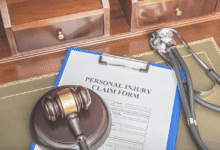How to File a Personal Injury Claim in New Jersey
Personal injury claim in New Jersey Learn how to file prove negligence and maximize compensation after an accident Get expert legal help today.

If you’ve been injured due to someone else’s negligence, knowing how to file a personal injury claim in New Jersey is crucial to securing the compensation you deserve. Whether your injury resulted from a car accident, slip and fall, medical malpractice, or another incident, New Jersey law allows victims to pursue financial recovery for medical bills, lost wages, and pain and suffering. However, the process involves strict deadlines, legal complexities, and negotiations with insurance companies making it essential to understand each step to protect your rights.
Navigating a personal injury claim in New Jersey requires careful documentation, knowledge of state laws, and often the assistance of an experienced attorney. From gathering evidence to filing paperwork and negotiating settlements, each stage plays a vital role in the success of your case. This guide will walk you through the entire process, ensuring you’re prepared to take the right actions at the right time to maximize your compensation.
How to File a Personal Injury Claim in New Jersey
Seek Immediate Medical Attention
Your health should be the top priority after an accident. Even if injuries seem minor, some symptoms may appear days later. Medical records serve as crucial evidence linking your injuries to the accident. Delaying treatment can weaken your claim, as insurers may argue your injuries were not severe or caused by the incident.
Document the Accident and Injuries
Gathering evidence is essential for building a strong case. Take photos of the accident scene, your injuries, property damage, and any hazardous conditions that contributed to the incident. Obtain contact information from witnesses, as their statements can support your claim. Keep a journal detailing your pain levels, medical treatments, and how the injury affects your daily life.
Report the Incident
Depending on the type of accident, you may need to file a report. For car accidents, notify the police and obtain a copy of the report. If you were injured on someone else’s property, inform the owner or manager and request an incident report. Workplace injuries should be reported to your employer immediately to qualify for workers’ compensation.
Notify the At-Fault Party’s Insurance Company
New Jersey is a no-fault state for auto accidents, meaning you first file a claim with your own Personal Injury Protection (PIP) insurance. However, if your injuries meet the state’s serious injury threshold, you can pursue a claim against the at-fault driver. For other types of accidents, you may need to file a claim with the negligent party’s insurer. Be cautious when speaking with adjusters, as they may try to minimize your payout.
Consult a Personal Injury Attorney
While minor claims can sometimes be handled independently, hiring an experienced personal injury lawyer in New Jersey significantly improves your chances of fair compensation. An attorney can assess liability, gather evidence, negotiate with insurers, and represent you in court if necessary. Most work on a contingency fee basis, meaning you only pay if they win your case.
File a Lawsuit Before the Statute of Limitations Expires
In New Jersey, the statute of limitations for personal injury claims is generally two years from the date of the accident. Missing this deadline can bar you from recovering compensation. If settlement negotiations fail, your attorney will file a lawsuit to protect your rights.
Types of Compensation Available
Economic Damages
Economic damages in New Jersey personal injury claims provide compensation for verifiable financial losses stemming from an accident or injury, covering both immediate and long-term expenses. These damages typically include past and projected medical costs such as emergency department, hospital stays, surgical procedures, prescription medications, and physical therapy, along with documented lost wages and diminished earning capacity if injuries prevent the victim from returning to work or advancing in their career. Additional recoverable expenses may involve rehabilitation services, necessary home or vehicle modifications for disability accommodations.
Non-Economic Damages
Non-economic damages in New Jersey personal injury cases compensate victims for the intangible, yet profoundly impactful, personal consequences of their injuries that extend beyond financial losses. These damages account for physical pain and suffering, including chronic pain conditions and permanent disabilities; psychological trauma such as anxiety, depression, or post-traumatic stress disorder (PTSD); diminished quality of life through the inability to engage in previously enjoyed activities or hobbies; and visible harms like scarring or disfigurement that affect self-esteem and social interactions.
Punitive Damages
Punitive damages in New Jersey serve as a powerful legal tool designed to punish defendants for particularly egregious conduct and deter future wrongdoing, rather than compensate victims. These damages are reserved for cases involving willful misconduct, gross negligence, or intentional harm such as drunk driving collisions, fraudulent concealment of product defects, or corporate malfeasance that demonstrates reckless disregard for public safety. New Jersey law imposes strict limits on punitive awards, capping them at either five times the amount of compensatory damages awarded or $350,000, whichever sum is greater.
Common Challenges in Personal Injury Claims
Disputing Fault or Claiming Shared Liability
Insurers often argue that the injured party was partially or fully responsible for the accident to reduce or deny Personal Injury Claim. In New Jersey, which follows a modified comparative negligence rule, if you’re found 50% or more at fault, you may be barred from recovering any damages. To counter this, your attorney can gather evidence such as police reports, witness statements, and accident reconstruction experts to prove the other party’s negligence.
Downplaying Injury Severity or Medical Necessity
Another common strategy involves insurers claiming that your injuries aren’t as serious as alleged or that certain treatments were excessive. They may request an independent medical examination (IME) conducted by a doctor they hire to challenge your diagnosis. To fight this, your lawyer can present medical records, doctor testimonies, and documentation of ongoing Personal Injury Claim and limitations to demonstrate the full extent of your injuries and justify treatment costs.
Read More: At-Will Employment in Texas: Can You Be Fired Without Reason?
Conclusion
Successfully filing a personal injury claim in New Jersey requires diligence, proper documentation, and a clear understanding of your legal rights. From seeking immediate medical attention to negotiating with insurance companies or pursuing litigation, each step plays a crucial role in securing fair compensation for your injuries. While the process can be complex, being well-informed and proactive significantly increases your chances of a favorable outcome.
If you’ve been injured due to someone else’s negligence, don’t navigate the legal system alone. Consulting with an experienced personal injury attorney in New Jersey can provide invaluable guidance, ensuring your claim is handled effectively while you focus on recovery. With the right support and timely action, you can achieve the justice and financial compensation you deserve for your injuries and losses.
FAQs
How long do I have to file a personal injury claim in New Jersey?
Most claims must be filed within two years of the Personal Injury Claim, but exceptions may apply for medical malpractice or government-related cases.
What if I was partially at fault for the accident?
New Jersey follows modified comparative negligence, meaning you can still recover damages if you are less than 50% at fault, but your compensation will be Personal Injury Claim.
Do I need a lawyer for a personal injury claim?
While minor claims can be handled alone, an attorney increases your chances of a fair settlement, especially in complex cases.
How much compensation can I receive?
The amount varies based on medical expenses, lost wages, pain and suffering, and the severity of your Personal Injury Claim.
What if the insurance company denies my claim?
Your attorney can negotiate with the insurer or file a lawsuit to pursue the compensation you deserve.











